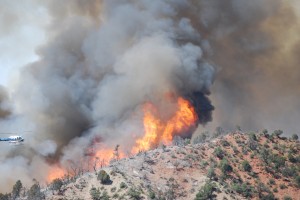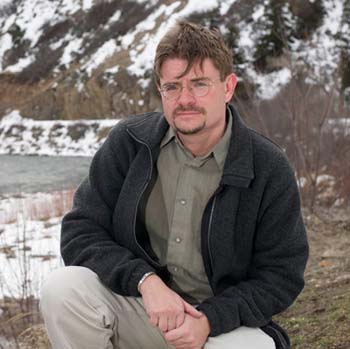 She had three dogs at her feet, two cats at the kennel and her girlfriend beside her on a motel lobby couch. Her VW van was full of climbing gear. Her motel room had a couple changes of clothes.
She had three dogs at her feet, two cats at the kennel and her girlfriend beside her on a motel lobby couch. Her VW van was full of climbing gear. Her motel room had a couple changes of clothes.
“I’ve been thinking a lot about impermanence,” Ashley Woods told me.
Until just a few hours earlier, the house she and Lisa Polansky share had been off limits. It was one of hundreds of homes that Boulder, Colorado residents were forced to evacuate when the Fourmile Fire came raging. After four days away, now that they could go home, they worried they might be forced to evacuate again if the fire flared up. They agreed to spend one more night in the motel, surrounded by the few things they were able to grab from the house before firefighters told them to leave.
“It makes me wonder,” Woods said, airing out a thangka she had bought on a trip to Nepal and managed to salvage from the home. “Should we just live more simply?”
Polansky laughed beside her. “I think you should live more simply,” she joked.
For fire victims, flames offer a real awakening. All the things we think make up our lives could be gone, suddenly, in a gale of cinders – and us with them. The moments before the fire arrives are terrifying. A world that seemed calm and still, a world that seemed like it had always seemed, suddenly gets tossed around by winds gusting like hurricanes. The sky turns black. The trees blow sideways. The air fills with the smell of smoke. Hot embers streak from the sky. The world we knew was gone, and in the chaos, we can’t guess what lies ahead.
Like hotels throughout Boulder after the Fourmile Fire, this Holiday Inn Express was filled with evacuees who had never dreamed this was how they’d spend the week after Labor Day. They left their houses with what they could grab and waited for word on when they could go home, or if they had a home to go back to at all. More than 160 families lost their home in the blaze.
What do you take? What do you leave behind? For a lot of Coloradans, and others who live in danger of wildfire, it’s not just cocktail party banter. It’s a question we’ve had to answer in a matter of minutes.
As a reporter who has covered more than my share of wildfires, I’ve seen a lot of answers to those questions. What do people take? Usually, it’s a mix of the practical and the sentimental. Legal papers. Birth certificates. Medical records. Passports. The computer. That’s the hard-nosed side of us. On the softer side, it’s almost always photos. Kids’ photos. Parents’ photos. Photos of family vacations. When we leave all else behind, papers and pictures are the things we cling to.
Not that everyone is so sparing when it’s time to leave. I’ve seen families take hours to load up trailers with kitchen gadgets, record collections, NASCAR posters and old stuffed animals. Some, of course, insist on staying home altogether.
“It’s my house,” one man once told me as he sent off his family with two trailer loads of stuff while he stayed behind to watch the flames approach. “I’ve been there 20 years. I wanna watch it. If it’s gonna go, I wanna see it go.”
For most, though, the threat of fire presents split-second desert island decisions. What do I need? What do I really, really want? What can I leave behind?
Fear makes an easy decision of what would otherwise be agonizing and heartbreaking. It’s not just stuff, after all. It’s stuff we love. It’s the stuff we think makes up our lives, the stuff that reminds us of our identities. It’s the family silver, the Pinewood Derby racecar, the honeymoon Champagne bottle. It’s barns full of horse tack, sheds full of skis and bikes and snowmobiles, garages full of old cars this close to running again.
Whether we’re Buddhist or not, the flames remind us in a hurry of what the Buddha tried to teach us long ago: none of these things we have collected is who we really are at all. Who we really are has just enough time to rush out the front door … with the dog.
If we look closer, the Buddha taught, we’re not really that either. Running away from a wildfire isn’t an optimal time to ponder the Heart Sutra, though, or to contemplate the Buddhist notion of emptiness.
For good reason, though, fire is central to a number of Buddhist ceremonies. Shingon Buddhists practice the Goma, burning offerings on a sacred flame and sending wishes up in smoke. The monks of Japan’s Todai-ji temple perform the stunning Omizutori festival each spring, setting alight giant torches and running across the balcony, showering onlookers below with purifying cinders. Tibetan Buddhists sometimes use fire in honorific puja ceremonies. Wrathful deities are portrayed in mandalas hoisting swords of fire in and dancing in flames, fiery displays that threaten to burn through our habit patterns and complacency. Fire urges us to come alive, to practice with intensity.
Lanterns glow in pagodas. Butter lamps burn at Himalayan shrines. Candles shine at home altars. What could teach a better lesson about emptiness than flame, which creates light and heat but has no substance? When it burns through a home, walls that seemed so permanent are no longer walls but embers. Tables are ashes. Cars are molten metal.
“Every existing this is emptiness,” the Heart Sutra says. Fire teaches it well.
What gets left behind? For Woods and Polanski, like good Boulderites leading the active outdoor lifestyle that has defined the town, it was a fortune in climbing gear and bikes. It was artwork collected from world travels. It was sculptures and paintings and photographs, some too big to fit in the car. A few things, like the Nepalese thangka, they salvaged when emergency workers let them slip back into their houses for a few hours. Most things, though, got left behind a second time.
These two women had a home to go back to, though. Other Boulderites weren’t so lucky. I watched one couple whose home had gone up in flames wheel all they could rescue from their house on two or three luggage carts through the motel lobby. Some had even less.
“I have treasures from all over the world,” April Story told me. “I have a huge art collection.”
She meant to say “had,” but using the past tense about her home of 25 years in Boulder’s Sunshine Canyon was hard to accept. Her house was gone. Her barn was gone. An artist who works with wildflowers, she lost collections of flowers gathered from 35 years.
She fled the house with her computer and a toiletry bag. She saved her cats and rode her horses to safety. The rest burned to the ground.
Story might have been devastated. Certainly she will miss the things that are gone, and miss them more over time as she remembers, one by one, all the things she can’t reach for that were once on a shelf or in a drawer. But she remained philosophical.
“If you get out with your health, if you have insurance, you realize, you know, I’m here,” she said. “I’m still standing. I’m still breathing.”
In the end, that’s enough.

